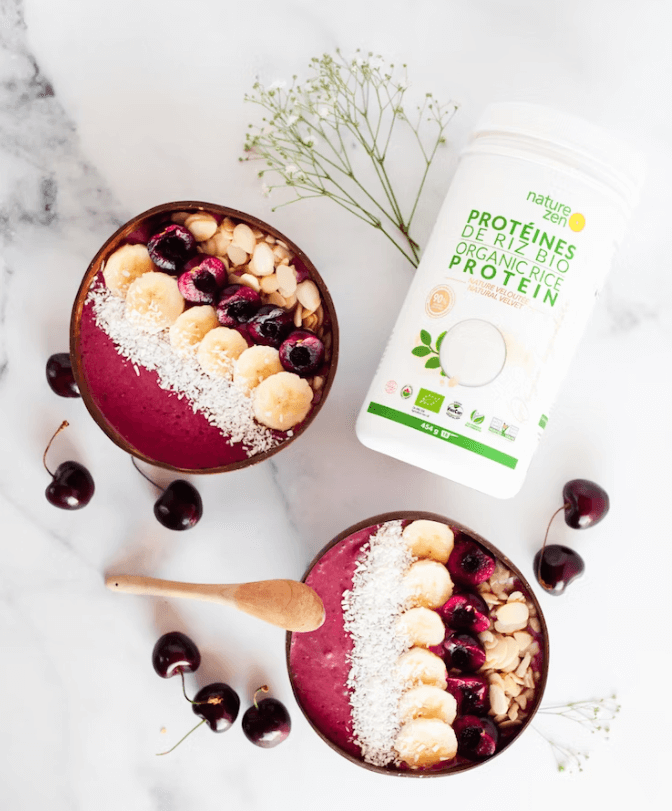Protein is a basic macronutrient, which is essential for our overall well-being and health. It is the building material for our bodies, for every cell in the body. Muscles, bones, skin, and hair – all of them require protein to grow and maintain. Recognizing the optimal protein consumption for ideal health is crucial, as it ensures we supply our body with the required resources to operate effectively, preserve strength, and mend tissues.
In this extensive guide, we will probe into the significance of protein, discuss its various forms, and investigate how to ascertain the appropriate quantity of protein for diverse populations. Additionally, we will scrutinize the origins of protein, its function in shedding weight, and the potential hazards of ingesting insufficient or excessive protein. In the end, you will possess a heightened awareness of your daily protein necessities and how to assimilate protein into your diet for supreme health.
Protein: What is it and why is it so important?
Protein,
a crucial macronutrient
alongside carbs and fats, is needed for proper bodily functions. Made of amino acid chains, proteins are vital for many biological processes. Amino acids can be either essential or non-essential; the former must be sourced from food, while the latter can be produced by the body. Overall, 20 unique amino acids form various protein structures in the body.
Protein has a vital function in our bodies, encompassing:
-
Growth and development: It is crucial for the growth and development of children, as well as for preserving muscle mass in adults.
-
Repair and maintenance: It is required for mending damaged tissues and upholding the integrity of our muscles, bones, skin, hair, and nails.
-
Hormone and enzyme synthesis: Numerous hormones and enzymes responsible for controlling metabolism, digestion, and immune response are composed of it.
-
Transportation and storage of molecules: It aids in the transport of diverse molecules, such as oxygen and nutrients, throughout the body.
Briefly, it is implicated in a
multitude of physiological processes
and it is an essential nutrient necessary for the accurate functioning of our bodies.
Daily consumption requirements
There is no ultimate answer for anybody. Protein requirements vary on age, sex, activity level, and overall health. Some recommendations can help you determine your optimal amount.
Methods for determining protein requirements:
-
RDA
: A common method for estimating daily nutrient needs, including protein. The current recommendation is 0.8g protein/kg body weight for adults. -
AMDR
: Another approach offering a protein intake range based on a percentage of total daily calories. For protein, the AMDR is set at 10-35% of the total daily calories for adults.
Protein quality:
Protein quality measures essential amino acid content and digestibility. Top-notch proteins contain all essential amino acids and are quickly absorbed. Animal proteins are usually high-quality. Plant-based proteins can also be great sources but may require strategic combinations for a complete amino acid profile.
Recommended daily intake of protein for different populations:
-
Adults: Generally, 0.8g protein/kg body weight is advised, but factors like activity, muscle mass, and health can affect this.
-
Athletes: Endurance and strength athletes may need 1.2-2.0g protein/kg body weight for muscle repair and growth.
-
Elderly: Some suggest 1.0-1.2g protein/kg body weight for maintaining muscle mass and strength in older adults.
-
Pregnant/Breastfeeding women: An extra 25g protein/day is recommended for fetal growth and breast milk production.
Remember, individual needs vary, so consult a professional for personalized advice.
Sources of Protein
Protein can be derived from an array of sources, such as animal-based, plant-based, and supplements.

Animal-derived protein sources:
-
Meat
-
Fish/seafood
-
Eggs
Plant-derived protein sources:
-
Legumes
-
Nuts/Seeds
-
Whole grains
-
Soy products
Protein supplements:
-
Whey protein: Derived from milk, whey protein is a favored supplement for athletes and those aiming to augment their protein consumption. It is rapidly absorbed and abundant in essential amino acids.
-
Plant-based protein powders: Pea, rice, and hemp protein powders are popular plant-based alternatives to whey protein, offering a convenient way to supplement protein consumption for vegetarians and vegans.
Examples of protein-rich meals and snacks:
-

Breakfast: Greek yogurt, granola, berries, scrambled eggs w/ spinach & cheese, or protein smoothie w/ fruit & almond milk.
-
Lunch: Grilled chicken salad w/ mixed greens, quinoa, avocado; turkey & cheese sandwich on whole wheat bread; or lentil soup w/ whole-grain crackers.
-
Dinner: Baked salmon w/ roasted veggies & brown rice, tofu/veggie stir-fry w/ quinoa, or bean/cheese burrito w/ whole wheat tortilla & salsa.
-
Snacks: Hummus with carrot sticks and whole-grain pita, a handful of mixed nuts, or a protein bar.
By integrating various protein sources into your diet, you can ensure you fulfill your daily protein needs while also benefiting from the distinct nutrients that each source offers.
Protein and weight loss
Protein helps with weight loss by managing hunger, preserving muscle mass, and boosting metabolism. Discover how to incorporate protein into your weight loss regimen.
Protein satiates and keeps you full longer, leading to less calorie intake and aiding weight loss. High protein meals stabilize blood sugar, controlling hunger.
When shedding weight, it is crucial to retain as much lean muscle mass as possible to maintain a healthy metabolism and prevent muscle deterioration. Consuming sufficient protein during weight loss can help safeguard muscle mass, ensuring that the weight reduction primarily originates from fat reserves.
The protein exhibits a higher thermic effect compared to carbohydrates and fats, meaning your body expends more energy to digest, absorb, and utilize the protein. This increased energy expenditure can contribute to a higher metabolic rate, further supporting weight loss endeavors.
Suggestions for integrating protein into a weight loss regimen:
-
Incorporate a protein source in every meal and snack to help curb hunger and preserve muscle mass.
-
Choose lean protein sources to reduce calorie intake.
-
Combine protein with fiber-rich foods.
-
Employ portion control to ensure you’re not consuming excessive calories from protein sources.
-
A protein shake or smoothie can be a great meal replacement or snack to boost protein intake as a low-calorie way of intake.
By understanding the role of protein and applying it in your routine, you can support your weight loss journey while preserving muscle mass and maintaining a healthy metabolism.
Risks of too little or too much protein
Protein is vital for optimal health, but it’s important to find the right balance.
Outcomes of protein insufficiency:
-
Stunted growth: Insufficient protein intake can hamper growth and development in children.
-
Muscle loss
: Protein deficiency may lead to muscle atrophy and weakness, as the body uses muscle tissue for protein. -
Weakened immunity: A lack of protein affects antibody and immune cell production, making one more prone to infections.
-
Delayed wound healing
: Protein is crucial for repairing and regenerating tissues. Insufficient protein intake can slow wound healing and raise the risk of infections.
Dangers of excessive protein consumption:
-
Kidney stress
: Consuming excessive protein may place additional strain on the kidneys, responsible for filtering waste products from protein metabolism. -
Dehydration risk: High-protein diets may increase water loss, leading to dehydration if fluids aren’t replenished.
-
Nutrient imbalance: Overdoing protein could result in fewer essential nutrients, potentially causing health issues.
-
Bone health questions: Some research suggests too much animal protein may affect calcium levels and bone health, though further study is needed.
Guidelines for balancing protein intake with other nutrients:
-
Stick to protein intake guidelines, tweaking them based on age, activity, and health.
-
Keep your diet balanced with carbs, fats, vitamins, minerals, and protein.
-
Mix up protein sources with both animal and plant options for diverse nutrients.
-
Drink plenty of water, especially with high-protein diets.
-
Seek professional advice for tailored dietary guidance.
By understanding protein intake risks, make smart choices for a nutrient-rich, healthy life.
Key Takeaways

This guide emphasized the critical role of protein in overall health and well-being. We also discussed protein requirements, quality, and daily intake for various populations, stressing the significance of including diverse protein-rich foods in our diets.
We highlighted protein’s significance in weight loss, addressing appetite management, muscle preservation, and metabolism enhancement. We also considered the potential risks of insufficient or excessive protein intake and offered recommendations for a balanced diet.
In conclusion, understanding protein needs and incorporating diverse sources into your diet promotes optimal health. By considering your age, activity level, and overall health, you can make informed protein intake decisions, ensuring your body functions at its peak.

 By myulikeadmin
By myulikeadmin



